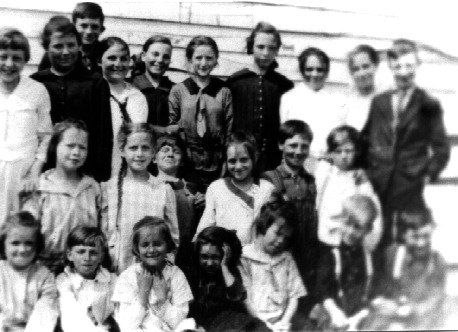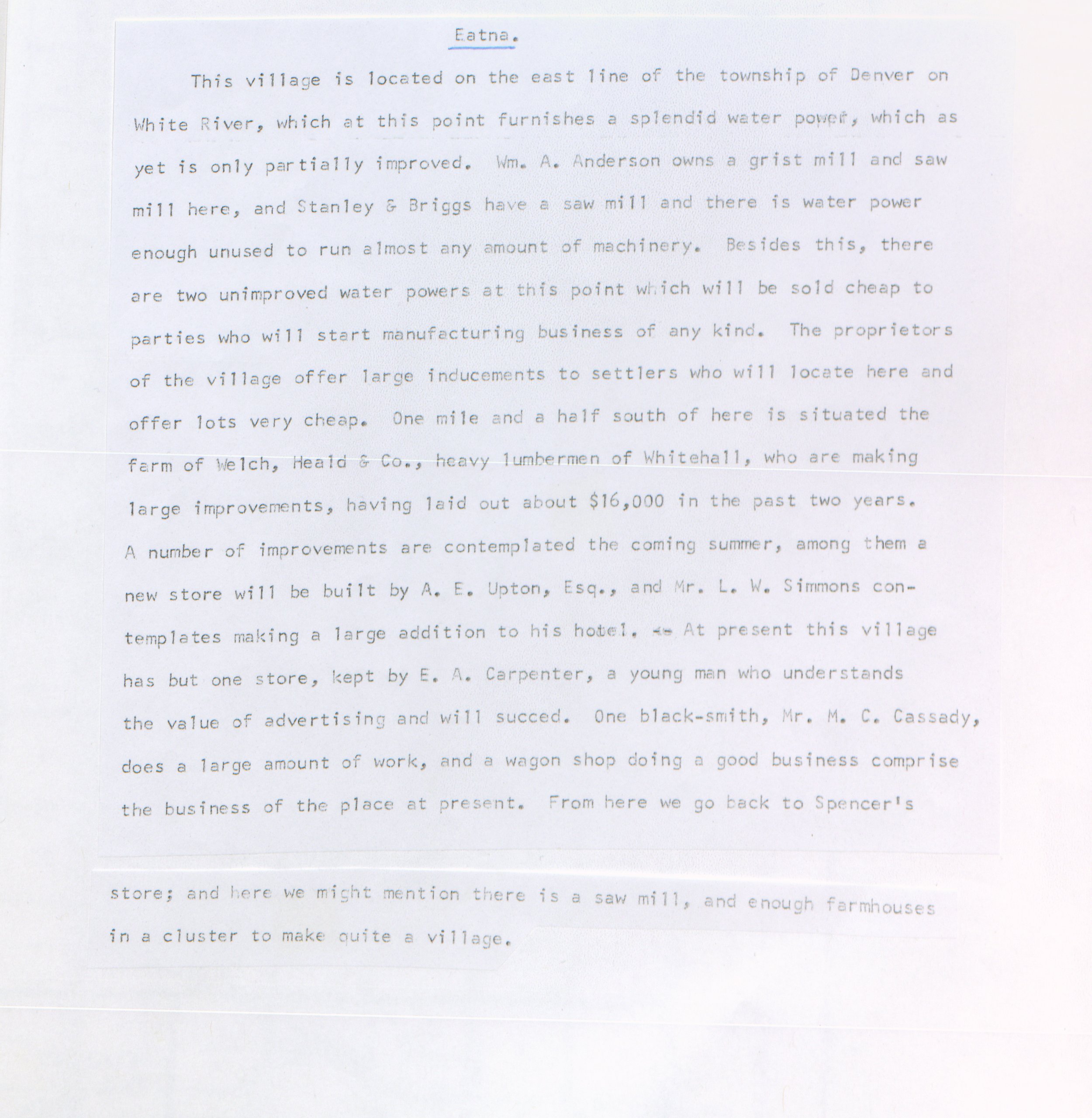The Aetna Community has been in existance for at least 115 years but for approximately 35 years it was located about a mile north of the Aetna we now know. For much of that time it was a thriving community with at least three general stores, (one complete with a cement sidewalk), a blacksmith shop, a wagon shop, an oxen shoeing establishment, a hotel, two saw mills, a grist mill and, for a while, a furniture factory owned by a Mr. Caruso. At least one of the chairs and a table made in that factory are still in existence.
Aetna's first saw mill was owned by John Mansfield in 1864, and later was sold to C. A. Stone. In 1870 Stanley and Briggs also operated a saw mill there.
Calvin Barnes was Aetna's first known store keeper. His store was on the west side of Main Street and he carried practically everything from drugs to river boots, which incidentally were made in his own shoemaker's shop. He also carried a complete line of dry goods. The post office was housed in his building.
Next to Mr. Barnes establishment was a general store, owned by Guy C. Pond, where you could stock up on groceries.
The storekeeper on the east side of Main Street must have prospered a little more than his competitors on the west side, for his general store had a cement sidewalk, the only one in town. This store was owned and operated by C. A. Stone.
The first blacksmith shop was owned by Edd Dill in 1864 and in 1870 was owned by M. C. Cassidy. George Miller operated the first oxen shoeing establishment, E. A. Carpenter had a wagon shop and a Mr. Shannon owned and operated the grist mill. A Mr. Skellington owned a shoe business and after a time Calvin Barnes sold his general store to
Mr. Skellington and went to Hesperia to open the first printing shop in that town. Mr. Skellington kept his business for about four years then he sold it and went to California. Nothing was heard from him after that.
In 1889 Sarah Bulson became Aetna's postmistress continuing in this capacity for approximately ten years. Then Jess White purchased the post office and moved it to Aetna's present location. Ed Doud bought and continued to operate the general store in the old location for a while. A portion of this building still stands and is a part of the home of Mrs. Rue Bulson.
A few years after Mr. White moved the post office, most of the business places in old Aetna were abandoned and as logging operations in the area discontinued most of the buildings, except for the places of residence, were torn down.
Somewhere along the line the old community of Aetna acquired the nickname of "Pinchtown". No one seems to know exactly when or where the title originated. Many tales have been told about it but the best known and accepted as the truth by some, is that one of the first storekeepers in Aetna, though very honest, was just a little on the parsimonious
side, and when weighing out a pound of crackers he would pinch one in half, if need be, in order made exactly one pound. Thus, the name Pinchtown originated. As the years rolled by and the post office was moved to the location we now know as Aetna, the name Pinchtown remained with the old community.
Prior to 1874 parents in the Aetna Community who wanted their children to have some "learning" had to send them to a little log schoolhouse a mile west and a quarter mile south of the present Aetna school. Then in 1874 a new school was built. Some of the first pupils to attend the new school were: Will Bunker, Arthur and Horace Dake, Delas and Carrie Anderson, Bert DeHaven, Will, Dave and Ida Delong, Ed and Stella Forbes, George, Frank, Gertrude, John and Alice, Dickinson, Hollis Hopkins, Ada and Mary Sanborn, George and Flora Doud, Dave, Jennie and Jessie Westbrook, Ada and Myrtle Ravait, Laura, George and Will Miller and Dillie Peterson.
Some of the early teachers were Mary Larave, George Routson, Will Millard, Oral Hawley, Frank Scott, Ada Scott, Arthur McCall, Mrs. Jim Anderson, Ada Wilbur, Zoe Graham, (Kuhn), David Robertson, Suzie Righter (Holt), Grace Graham (Miller), Blanch Balcolm, Sarah Redeiar, Romanda Carpenter, Mr. Carpenter, Jessie Hardy, Nora Crank, Jennie Day and Jennie Tibhits (Cochrane).
Teachers who taught from 1901 were: Lela Hinks, Zoe Doud, Grace Ryeson, Esther Neely, Frank King, Iva Doud, Minnie Britton, Mamie Jones, Gertrude Wood, John Libers, Anna Lordon, Daniel Sage, Edward Church, J. O. Nelson, Floyd French, Mertie Jackson (Bird), Julia Brown (Ditlow), Ethel Joslin, Harry A. Graves, Winifred Spencer, Bessie L. LaPreze, Leila Starn (Westbrook), Zoe Branch, Carrie Waldo, Regina Smith, Dale Powers, Frances Reed (Mankin), Jean Clemens, Laura Govings, Zelma Meyers, Marvel Lundquist, and Mable Horton.




















